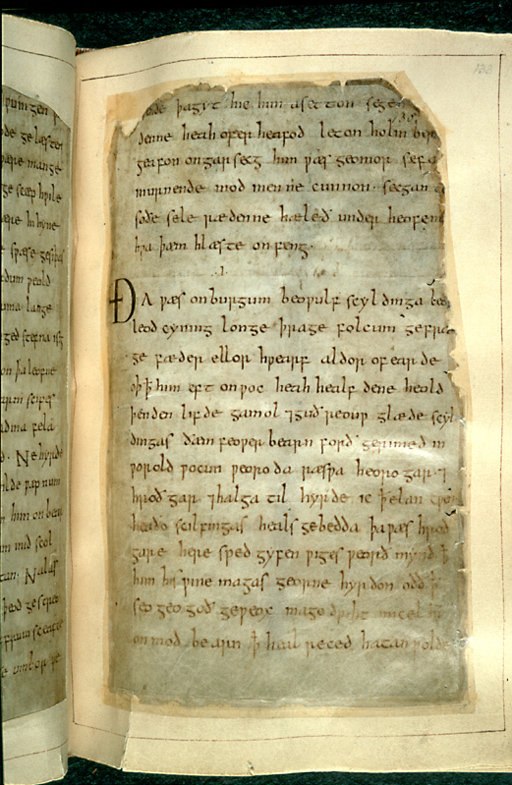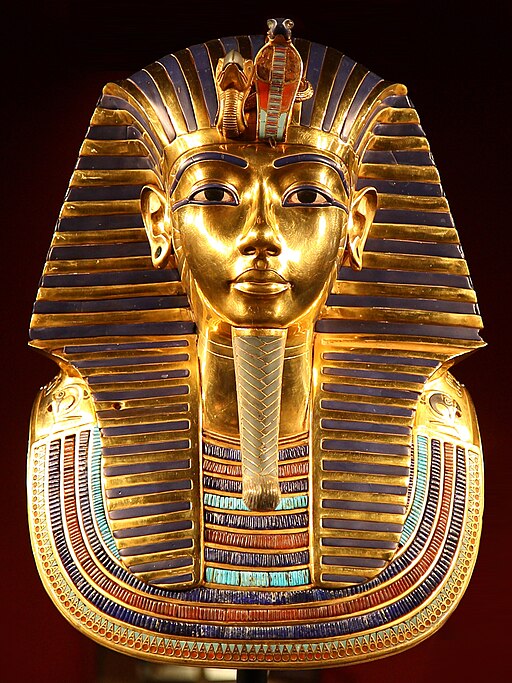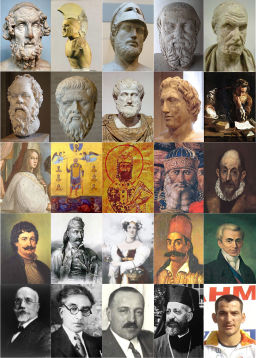
Beowulf is an Old English epic poem that survives in a single copy in the manuscript known as the Nowell Codex. It has no title in the original document but has become known by the name of the story’s hero.
The poem is known only from a single manuscript, which is estimated to date from around 975–1025.
The manuscript dates either to the reign of Æthelred the Unready or to the beginning of the reign of Cnut the Great from 1016.
The Beowulf manuscript is known as the Nowell Codex, gaining its name from the 16th-century owner and scholar Laurence Nowell.
The earliest surviving reference to the Nowell Codex was made about 1650, and the prior ownership of the codex before Nowell remains a mystery.
The Beowulf manuscript itself is identified by name for the first time in an exchange of letters in 1700.
In 1731, the manuscript was damaged by a fire, and the margins were charred, and several readings were lost.
Rebinding efforts, though saving the manuscript from much degeneration, have nonetheless covered up other letters of the poem, causing further loss. The Nowell Codex is today preserved and exhibited in the British Library.
The dating of Beowulf has opinion divided as to whether it was written in the 8th century or whether the composition of the poem was contemporary with its 11th-century manuscript.
A proto-version of the poem may have also been orally transmitted for many generations before being transcribed in its present form.
J. R. R. Tolkien believed that the poem retained a genuine memory of Anglo-Saxon paganism and was composed no more than a few generations after the Christianisation of England around AD 700.

Beowulf
The Beowulf poem consists of over three thousand alliterative lines. It is one of the most important works of Old English literature. The anonymous poet is referred to by scholars as to the “Beowulf poet.”
The story was set in Scandinavia in the 6th century. Beowulf, the hero leaves his home and comes to the aid of the king of the Danes, whose mead hall has been under attack by a monster known as Grendel.
After Beowulf slays Grendel, Grendel’s mother attacks the hall, and she is also defeated. Victorious, Beowulf then returns to his home and becomes king.
Fifty years later, Beowulf defeats a dragon but is mortally wounded in the battle. After his death, his followers cremate his body and erect a tower on a headland in his memory.
Nowell Codex
The Nowell Codex is one of the four significant Anglo-Saxon poetic manuscripts. It is most famous as the manuscript containing the only copy of the epic poem Beowulf.
In addition to this, it contains first a fragment of “The Life of Saint Christopher,” followed by the “Wonders of the East” and “Letters of Alexander to Aristotle,” and, after Beowulf, a poetic translation of “Judith.”
Due to the fame of Beowulf, the Nowell codex is also sometimes known only as The Beowulf manuscript. The manuscript is located within the British Library with the rest of the Cotton collection.
Beowulf and J. R. R. Tolkien
In the 1920s, Tolkien undertook a translation of Beowulf, which he finished, but did not publish. It was finally edited by his son and published in 2014, more than 40 years after Tolkien’s death.
Tolkien did, however, use his translation to present a highly acclaimed lecture, “Beowulf: The Monsters and the Critics,” which had a lasting influence on Beowulf research.
Tolkien established the supremacy of the poetic nature of the work as opposed to its purely linguistic elements.
Tolkien would begin his series of lectures on Beowulf with a great cry of “Hwæt!” the first word of Beowulf and several other Old English poems.
It was his impersonation of an Anglo-Saxon bard in a mead hall. For Tolkien, Beowulf was a powerful piece of dramatic poetry, and he presented it dramatically.
Decades later, when W. H. Auden wrote to Tolkien, his former professor, stating:
“I don’t think that I have ever told you what an unforgettable experience it was for me as an undergraduate, hearing you recite Beowulf. The voice was the voice of Gandalf.”
Tolkien argued that the author of Beowulf was addressing human destiny in general; the story was not limited to any specific tribal politics. Therefore the monsters were essential to the poem.
Tolkien had high regard for Beowulf, and it influenced his Middle-earth legends. He stated:
“Beowulf is among my most valued sources.”
Beowulf – Nowell Codex
- Title: Beowulf – Nowell Codex
- Date: 975–1025
- Culture: Saxon
- Writing: West Saxon dialect of Old English
- Dimensions: 245 × 185 mm
- Type: Ancient Texts
- Museum: British Library
Beowulf | Summary & Analysis
The Beowulf Manuscript
Virtual Tour of the British Library
- Theatrum Orbis Terrarum
- Constitution of the Athenians by Aristotle
- “Newton after Blake” by Eduardo Paolozzi
- The Beowulf Manuscript – Nowell Codex
Guide for Beowulf
Virtual Tour of Ancient Texts
- Gilgamesh Flood Tablet – 7th century BCE
- Lament for Ur – 1800 BC
- Law Code of Hammurabi – 1754 BC
- Book of the Dead – Papyrus of Ani and Hunefe – 1250 BCE
- Cyrus Cylinder – 539–538 BC
- The Rosetta Stone – 196 BC
- Constitution of the Athenians by Aristotle – 100
- Vindolanda Tablets – 1st-century
- Codex Vaticanus – 300–325
- Vienna Dioscurides – Juliana Anicia Codex – 515
- Beowulf – Nowell Codex – 975–1025
- Blue Qur’an – 9th – 10th century
- Miroslav Gospel – 1186
- Hadith Bayad wa Riyad – 13th-century
- The Belles Heures of Jean of France, Duke of Berry – 1405
Audio Book Beowulf
Virtual Tour of Historically Influential Books
- Code Noir – 1687
- “Common Sense” by Thomas Paine – 1766
- “Poems on Various Subjects, Religious and Moral” by Phillis Wheatley – 1766
- Gardner’s Photographic Sketchbook of the Civil War – 1863
- Ancient Texts and Historically Influential Books
The Story of a Single Manuscript | Cotton MS Vitellius A XV
Beowulf (Old English)
~~~
“Each of us must accept the end of life here in this world—so we must work while we can to earn fame before death.”
– Beowulf
~~~
Photo Credit: 1) anonymous Anglo-Saxon poet / Public domain
Popular this Week








 Sponsor your Favorite Page
Sponsor your Favorite Page SEARCH Search for: Search Follow UsJoin – The JOM Membership Program
Sponsor a Masterpiece with YOUR NAME CHOICE for $5
Share this:
- Tweet
